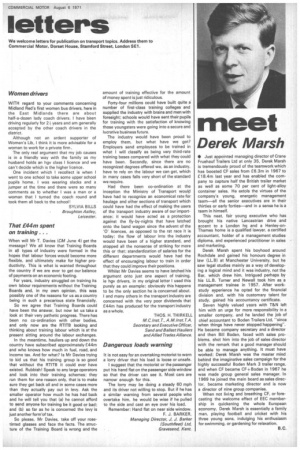letters
Page 47

If you've noticed an error in this article please click here to report it so we can fix it.
We welcome letters for publication on transport topics, Address them to Commercial Motor, Dorset House, Stamford Street, London SE1.
Women drivers
WITH regard to your comments concerning Midland Red's first women bus drivers, here in the East Midlands there are about half-a-dozen lady coach drivers. I have been driving regularly for 2 years and am generally accepted by the other coach drivers in the district.
Although not an ardent supporter of Women's Lib, I think it is more advisable for a woman to work for a private firm.
The only real argument that my job causes is in a friendly way with the family as my husband holds an hgv class I licence and we can't decide which is the higher licence.
One incident which I recollect is when I went to one school to take some upper school pupils home. I was wearing slacks and a jumper at the time and there were so many comments as to whether I was a man or a woman that I turned the coach round and took them all back to the school' SYLVIA BILLS Broughton Astley, Leicester.
That £44m spent on training . . .
When will Mr T. Davies (CM June 41 get the message? We all know that Training Boards in all types of industry were formed in the hopes that labour forces would become more flexible, and ultimately make for higher productivity. This is what is wanted throughout the country if we are ever to get our balance of payments on an economic footing.
For years, industry struggled on training its own labour requirements without the Training Boards and, in my own opinion, this was possibly one of the reasons for us as a country being in such a precarious state financially.
So we agree that Training Boards could have been the answer, but now let us take a look at their very pathetic progress. There has been no co-ordination with other bodies, and only now are the RTITB looking and thinking about training labour which is at the present sitting around the labour exchanges.
In the meantime, hauliers up and down the country have subscribed approximately £44m and who knows how much in fuel, road, and income tax. And for what? Is Mr Davies trying to kid us that his training group is so good that without the RTITB it could ever have existed. Rubbish! Speak to any large operators and look into their training schemes; they run them for one reason only, that is to make sure they get back all and in some cases more than they actually pay out in levy. Ask the smaller operator how much he has had back and he will tell you that (a) he cannot afford to send anyone for training be it good or bad; and lb) so far as he is concerned the levy is just another form'of tax.
So please, Mr Davies, take off your rosetinted glasses and face the facts. The structure of the Training Board is wrong and the amount of training effective for the amount of money spent is just ridiculous.
Forty-four millions could have built quite a number of first-class training colleges and supplied the industry with brains and men with foresight; schools would have sent their pupils for training with the satisfaction of knowing those youngsters were going into a secure and lucrative business future.
The industry would have been proud to employ them, but what have we got? Employers send employees to be trained in what I will classify as being very third-rate training bases compared with what they could have been. Secondly, since there are no recognized degrees offered we, as an industry, have to rely on the labour we can get, which in many cases falls very short of the standard we require.
Had there been co-ordination at the inception the Ministry of Transport would have had to recognize an economical rate for haulage and other sections of transport which could have had the effect of making the users of the transport industry aware of our importance; it would have acted as a protection against the fly-by-nights that have latched onto the band wagon since the advent of the '0' licences, as opposed to the rat race it is today; the flow of labour into the industry would have been of a higher standard, and stopped all the nonsense of striking for more this or that: standardization of salaries for the different departments would have had the effect of encouraging labour to train in order that they could improve their positions.
Whilst Mr Davies seems to have latched his argument onto just one aspect of training, le hgv drivers, in my original letter I used this purely as an example; obviously this happens to be the only section he is concerned about. I and many others in the transport industry are concerned with the very poor dividends that £44m has produced for the transport industry as a whole.
THOS. H THIRKELL M C. Inst.T., A.M.Inst.T.A.
Secretary and Executive Officer. Sand and Ballast Hauliers and Allied Trades Alliance.
Dangerous loads warning




























































































































